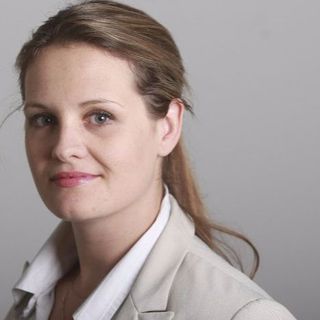
34 – JP Koning on Goldbugs, African Monetary History, and Fedcoin
JP Koning is an economic consultant and writer. He joins the show to discuss fascinating stories in monetary history in Libya, Zimbabwe, and Switzerland. He also shares his thoughts on Blockchain technology and Fedcoin, a hypothetical cryptocurrency stabilized by the Federal Reserve. David’s blog: http://macromarketmusings.blogspot.com/ JP’s blog “Moneyness”: http://jpkoning.blogspot.com/ David’s Twitter: @davidbeckworth JP’s Twitter: @JP_Koning Related links: “What Happens When a Central Bank Splits in Two?” by JP Koning http://jpkoning.blogspot.com/2016/06/what-happens-when-central-bank-is-split.html “A Modern Example of Gresham’s Law” by JP Koning http://jpkoning.blogspot.com/2016/11/a-modern-example-of-greshams-law.html “Fedcoin” by JP Koning http://jpkoning.blogspot.ca/2014/10/fedcoin.html
28 Nov 201659min

33 - Mark Calabria on Housing Policy and the Behavioral Case for Monetary Rules
Mark Calabria is the director of Financial Regulation Studies at the Cato Institute. Before joining Cato in 2009, he worked as a member of the senior staff of the U.S. Senate Committee on Banking, Housing, and Urban Affairs. He joins the show to discuss working on Capitol Hill amidst the 2008 financial crisis. Mark also discusses his recent Cato paper where he argues insights from behavioral economics suggest monetary policy should be more rules-based. David’s blog: macromarketmusings.blogspot.com/ Mark’s Cato Institute profile: https://www.cato.org/people/mark-calabria Mark’s Alt-M archive: http://www.alt-m.org/author/calabria/ David’s Twitter: @davidbeckworth Mark’s Twitter: @markcalabria Related links: “Yes, the Fed has a Diversity Problem” by Mark Calabria https://www.cato.org/blog/yes-federal-reserve-has-diversity-problem “Behavioral Economics and Fed Policymaking” by Mark Calabria https://object.cato.org/sites/cato.org/files/serials/files/cato-journal/2016/9/cj-v36n3-6.pdf
21 Nov 20161h 6min

32 - Roger Farmer on the Natural Rate of Unemployment Hypothesis and Prosperity for All
Roger Farmer is a Distinguished Professor of Economics at UCLA. He joins the show to discuss his new book, Prosperity for All: How to Prevent Financial Crises. He and David also discuss his criticism of the natural rate of unemployment hypothesis, an important proposition in mainstream macroeconomics. David’s blog: http://macromarketmusings.blogspot.com/ Roger’s personal website: http://www.rogerfarmer.com/ David’s Twitter: @davidbeckworth Roger’s Twitter: @farmerrf Related links: Roger’s UCLA profile http://www.econ.ucla.edu/faculty/regular/Farmer.html Prosperity for All: How to Prevent Financial Crises by Roger Farmer https://global.oup.com/academic/product/prosperity-for-all-9780190621438?cc=us&lang=en& “The Natural Rate Hypthesis: An Idea Past Its Sell-by Date” by Roger Farmer http://www.nber.org/papers/w19267
14 Nov 201658min

31 – Mark Koyama on the Macroeconomics of Ancient Rome
Mark Koyama is an Assistant Professor of Economics at George Mason University and a Senior Fellow at George Mason University’s Mercatus Center. He joins the show to discuss his research on the economic history of ancient Rome from the rise of the Roman Republic to the transition to the Roman Empire to the Empire’s eventual fall. David’s blog: http://macromarketmusings.blogspot.com/ Mark’s Medium page: https://medium.com/@MarkKoyama Mark’s GMU profile: http://economics.gmu.edu/people/mkoyama2 David’s Twitter: @DavidBeckworth Mark’s Twitter: @MarkKoyama Related links: “The Roman Market Economy” by Peter Temin (2012, Princeton University Press) http://press.princeton.edu/titles/9896.html “Peter Temin and the Malthusian Hypothesis for the Limits of Roman Growth” by Mark Koyama https://medium.com/@MarkKoyama/peter-temin-and-the-malthusian-hypothesis-for-the-limits-of-roman-growth-12489edce93a#.ijytapey2 “Why did the Roman Economy Decline?” by Mark Koyama https://medium.com/art-marketing/why-did-the-roman-economy-decline-225deada66ea#.xnwksin86
7 Nov 20161h 2min

30 - Rudi Bachmann on German Macroeconomics, Walter Eucken, and Ordoliberalism
Rüdiger (Rudi) Bachmann is a Stepan Family Associate Professor of Economics at the University of Notre Dame. He joins the show to discuss the economic history of his native Germany. David and Rudi also discuss how the German approach to macroeconomics is distinctly different from the approach taken in the United States. David’s blog: macromarketmusings.blogspot.com/ Rudi’s Notre Dame webpage: https://www3.nd.edu/~rbachman/ David’s Twitter: @DavidBeckworth Related links: Rudi on his work on economic uncertainty: https://www.youtube.com/watch?v=6XDlzBgf1uE NYT Upshot Article: “How Economists Came to Dominate the Conversation” http://www.nytimes.com/2015/01/24/upshot/how-economists-came-to-dominate-the-conversation.html?_r=0 Peter Bofinger’s Vox EU article: “German Macroeconomics: The Long Shadow of Walter Eucken” http://voxeu.org/article/german-macroeconomics-long-shadow-walter-eucken
31 Okt 20161h 1min

29 - Narayana Kocherlakota on the FOMC, the 2008 Crisis, and Monetary Rules
Narayana Kocherlakota is the Lionel W. McKenzie Professor of Economics at the University of Rochester, and he previously served as president and CEO of the Federal Reserve Bank of Minneapolis. He joins the show to discuss to discuss what it is like working as a Fed president and a member of the Federal Open Market Committee. He also shares some of his thoughts on the drawbacks of current proposals on establishing monetary rules. David’s blog: macromarketmusings.blogspot.com/ Narayana’s website: https://sites.google.com/site/kocherlakota009/ David’s Twitter: @davidbeckworth Narayana’s Twitter: @kocherlakota009 Related links: Narayana’s profile, speeches, and articles as Fed president: https://www.minneapolisfed.org/about/more-about-the-fed/presidents-of-the-minneapolis-fed/narayana-kocherlakota Narayana’s Bloomberg archive: https://www.bloomberg.com/view/contributors/APvwpZqjDaA/narayana-kocherlakota/articles Narayana’s Brookings article: Rules vs. Discretion: A Reconsideration https://www.brookings.edu/bpea-articles/rules-versus-discretion-a-reconsideration/ Responses to the Brookings article by John Taylor and George Selgin: https://economicsone.com/2016/09/17/kocherlakota-on-the-fed-and-the-taylor-rule/ http://www.alt-m.org/2016/09/22/rules-discretion-audacity-critique-kocherlakota/
24 Okt 201659min

28 - Izabella Kaminska on Blockchain Technology and the Economics of Star Trek
Izabella Kaminska is a writer for the Financial Times at its premier blog, FT Alphaville. She joins the show to discuss her work on blockchain technology as well as current proposals on monetary and fiscal policy. Finally, Izabella and David, who are both big sci-fi fans, talk about economics in the Star Trek and Star Wars sagas. David’s Twitter: @DavidBeckworth Izabella Kaminska’s Twitter: @izakaminska David’s blog: http://macromarketmusings.blogspot.com/ Izabella Kaminska’s FT bio and archive: http://ftalphaville.ft.com/meet-the-team/izabella-kaminska/ Related links: “You see, money doesn’t exist in the 24th century” – Izabella Kaminska http://ftalphaville.ft.com/2015/10/12/2142030/you-see-money-doesnt-exist-in-the-24th-century/ Even lower rates? “Thanks but no thanks” say banks everywhere – Izabella Kaminska http://ftalphaville.ft.com/2016/07/11/2168870/even-lower-rates-thanks-but-no-thanks-say-banks-everywhere/ Trekonomics: The Economics of Star Trek – Manu Saadia https://www.amazon.com/Trekonomics-Economics-Star-Manu-Saadia/dp/1941758754 It’s a Trap: Emperor Palpatine’s Poison Pill – Zachary Feinstein https://arxiv.org/pdf/1511.09054.pdf
17 Okt 20161h 1min

27 - Claudio Borio on Financial Stability, the Triffin Dilemma, and International Monetary Policy
Claudio Borio is the director of the monetary and economic department at the Bank for International Settlements (BIS). He joins the show to discuss his career in monetary policy, banking, and macroprudential regulation. In particular, he and David discuss problems afflicting the Eurozone and how to address massive financial imbalances across the world. David’s Twitter: @DavidBeckworth Claudio’s bio and research: https://www.bis.org/author/claudio_borio.htm David’s blog: macromarketmusings.blogspot.com/ Related links: “Revisiting Three Intellectual Pillars of Monetary Policy” by Claudio Borio http://object.cato.org/sites/cato.org/files/serials/files/cato-journal/2016/5/cj-v36n2-1.pdf
10 Okt 20161h 5min






















